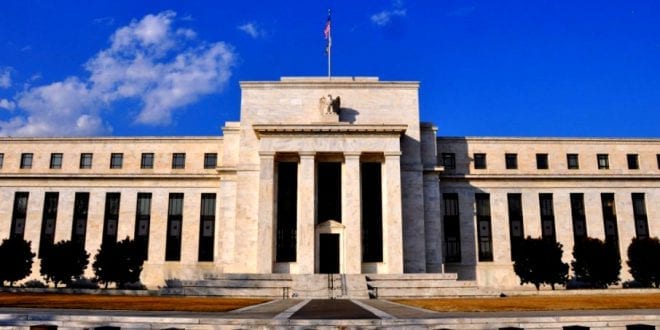Herland Report: When all Bitcoin issued equals the amount the Exchange Stabilization Fund allocates to itself for illicit operations, that gets attention. And since Bitcoin mania is extant, that $350Bn in bitcoin has grabbed everyone else’s attention too.
So when the ESF is aware that a slush fund exists almost equal to its own, why won’t the Treasury shut it down?
Bitcoin Disciples say protection against Central Bank intervention is a feature of bitcoin’s distributed technology, and to some extent that’s true, writes author Steve Brown, a regular contributor to The Herland Report.
But the exchanges are not distributed, they are finite operations with single points of failure. And the exchanges can be shutdown or have their access limited by the US Treasury. In 2017 the Treasury did just that, and forced the Bittrex exchange to seize bitcoin accounts based in Iran.
To this day, Bittrex, Coinbase, LocalCoins, and Binance exchanges do not accept accounts based in Iran. While Bitcoin proselytizers may not care, that disturbing precedent exists.

Bitcoin mania and the US Treasury control: Theoretically, a US Treasury shutdown of Bitcoin might make sense. The ‘dollar value’ of Bitcoin overall is small compared to US dollar market share; Bitcoin does not exist in the form of Federal Reserve Notes (FRN — or an unconverted digital equivalent); and presumably Bitcoin competes with the ESF slush fund. Then why wouldn’t the Fed/Treasury shut it down?
Since Bitcoin does not compete for dollar market share, the Treasury may consider BTC to be a useful adjunct to the ESF slush fund.
RELATED ARTICLES:
- Federal Reserve rigging bond markets: Do financial markets still exist?
- Billionaires control by politically funded activism.
- The Federal Reserve Cartel – Eight Families own the USA #BIS, IMF, World Bank – Dean Henderson.
- The Federal Reserve US oligarch owners: Out-sourcing the Monetary System since 1913.
After all, BlackRock has implicitly said so. The take is that Bitcoin provides a repository for inflationary US dollars to Primary Dealers and others with billions to stash. What to do with a few billion? The commodity market is not an option when dollars are pulled out of market shares.
Bitcoin though allows Deep Pockets to avoid Fed/Treasury sterilization of capital controls when wealthy dealers pull billions out of the market. Another example, the Bank of New York Mellon charges interest to large cash depositors, otherwise known as negative interest rates.
But the risk-on nature of Bitcoin is in holding volatile large amounts where the occasional exchange failure or limit on withdrawals adds to risk. (Mount Gox, OKEx, etc) But JPM’s own statement about Bitcoin provides insight that banks increasingly see Bitcoin as a tool to be used for their own slush funds.
There is good reason that the Fed/Treasury may accept Bitcoin’s opaque but distributed structure. Even though the ESF can engage in any financial transaction under any circumstance — such as indirectly supplying funds and weaponry to terrorists or color revolutions via the CIA or US intelligence agencies without oversight — the ESF still must provide a balance sheet to Congress every six months.
And what better option is there for the ESF than to have its own Treasury-managed slush fund enhanced by a black ops operational slush fund like Bitcoin? And what better place to stash or lose those inflationary dollars than Bitcoin?
The Treasury may wish to blow up dollars there, instead of on a battlefield or pointless inflationary government contract as the US government is wont to do. After all, despite the volatility, BTC funds will be available later.
Point being that the Treasury may not see Bitcoin as a competitor at all, but as an accomplice slush fund to its own (ESF) slush fund.
That becomes an issue for the Treasury when Bitcoin is used to evade the Treasury’s own weaponization of the US dollar, or when Bitcoin and crypto currency in general compete seriously with the USD. We haven’t reached that point yet. However there are warning signs ahead.
Based on recent developments in Russia and China, with their own cyber-currencies, payments in BTC will be banned but trading in Bitcoin will be allowed.
Bitcoin mania: In other words, an individual may not transact purchases with BTC, but can buy and sell BTC only. Paypal already operates this system in the US, however Paypal states that it will allow payment transactions in BTC in 2021. And no doubt Central Governments will enforce a cashless society soon, at least in the G20 nations, via their own crypto-currency.
In 2009, Bitcoin’s original intent was to avoid central bank controls via a distributed network with no single point of failure, even if the individual exchanges could be taken down.
Now that nation states are competing to setup their own crypto-currencies, they must inevitably confront that crypto-competition eventually. Being a particular issue for the Fed/Treasury and SEC, which will take a large and dim view for example of Paypal, allowing BTC for transaction of purchases.
As these State systems evolve, this author predicts that BTC will be challenged as a payment system – probably through its exchanges — while the BTC distributed network continues on as a speculative vehicle. We shall see, and at what time the tulip bulbs begin to rot is anyone’s guess…
Twitter: @newsypaperz
Also check out these topics at CNN or FOX News. Other sources may be New York Times, USA Today, the Washington Post or from the British angle, BBC, The Guardian, The Telegraph or Financial Times.
Led by Scandinavian bestselling author, Hanne Nabintu Herland, The Herland Report news and opinion website provides independent analysis from leading Western intellectuals and ground breaking YouTube interviews, cutting through the mainstream media rhetoric. It is a great place to watch interviews and read the articles of leading intellectuals, thought leaders, authors and activists from across the political spectrum. The Herland Report believes in freedom of speech and its editorial policy resides above the traditional Left vs Right paradigm which we believe has lost its relevance and ability to describe the current driving forces in Western politics.









